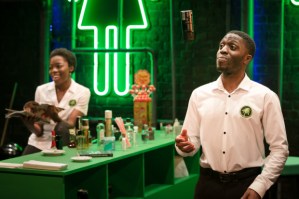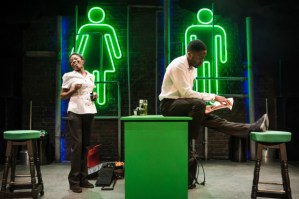Review: Counting Stars (Theatre Royal Stratford East)
Atiha Sen Gupta’s play opens your eyes to some truths about nightclub toilet attendants
If you’ve been to a nightclub in the last decade, you’ll probably have ignored them: the men and women who sit in the toilets selling spritzes of perfume, condoms and lollipops to wasted punters, sometimes intoning bored little rhymes – "no spray/no lay, no splash/no gash" being a particularly charming one quoted in Atiha Sen Gupta‘s play.
Counting Stars makes us see the heart in this soulless job. Sophie and Abiodun are Nigerian immigrants, working cleaning jobs in the day as well toiling in the toilets of the misnamed Club Paradise nightclub in Woolwich at night in order to make rent. They met on the job, and fell in love; it’s Valentine's night and their first anniversary. We see the pair either side of an imaginary wall in the nightclub loos, economically evoked with neon signs, rows of celebrity perfumes, and a constant bassline rumble. With cabaret club-style seating and a free shot (of neon-hued juice) on entry, there are some fairly low-level attempts to further create a club atmosphere.
Estella Daniels and Lanre Malaolu address the audience, giving us insights into their relationship, and their conflicted approaches to this frankly demeaning role: Abiodun is forced by his boss to sing humiliatingly jaunty tunes ("freshen up for punani") that customers film on their phones; he retches as he cleans up sick with hands wrapped in toilet roll, and is referred to by drunken, racist louts as the "bog wog". Oh, and they don’t get paid: toilet attendants only make what they can sell or earn in tips. All these details are, shamefully, actually true. Sen Gupta’s play genuinely does that thing theatre often claims to do: opens your eyes to the situation of others you previously overlooked.
Not that, for the most part, this short play is grim: both Malaolu and Daniels find great wells of life and love in their characters, and their attraction and affection shines through, despite their separate stalls. But while Daniels is open-hearted and optimistic as Sophie – she sees her job as part stylist, part counsellor to the poor pissed-up, preening, heart-broken girls of Woolwich – Malaolu sharply delineates Abiodun’s cynicism and bitterness about his work. What begins as a sweetly enjoyable picture of a relationship thriving despite desperate economic times becomes an angrier vision of a divided country, where solidarity between the have-nots has vanished in a cloud of fear, and racism and resentment are only ever a spilled drink away.
Pooja Ghai's production lags a little in its middle before building, fairly predictably, to a nasty climax. There were also issues with lines on press night. But the way both actors slip between their main parts and acting out other characters – Malaolu as a wheezy, sleazy nightclub boss; Daniels as a distraught clubber – is mostly well done and, in the final scenes, proves both surprisingly tense and very affecting. Sen Gupta’s play succeeds in not only uncovering uncomfortable economic facts about people and jobs we usually look straight through, but also imbues her characters with real life and warmth.
Counting Stars runs at Theatre Royal Stratford East until 17 September.














